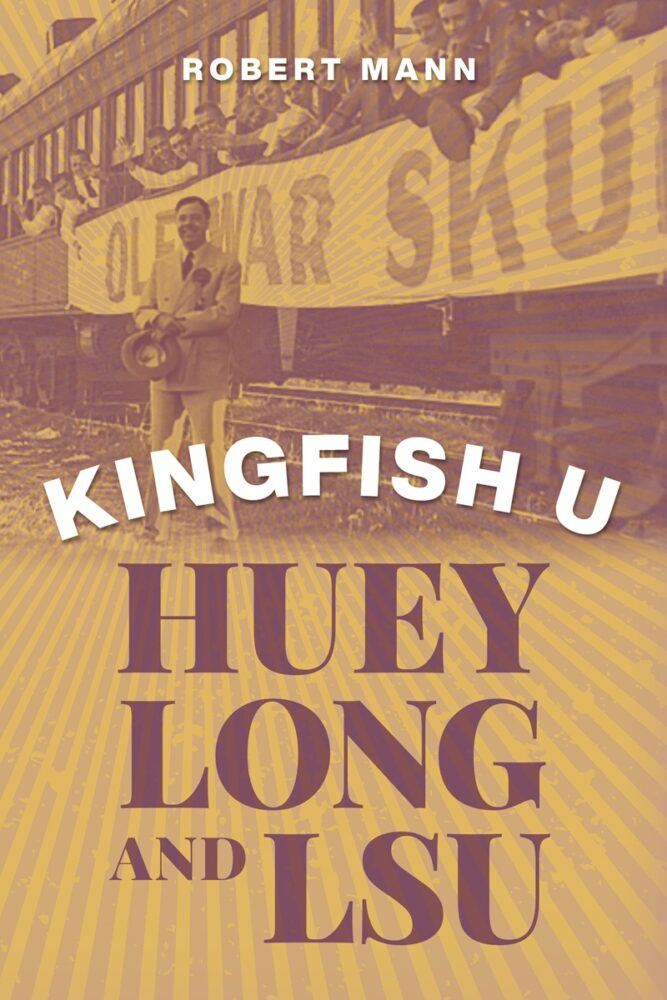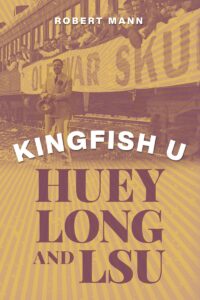Almost as Good as Football
Robert Mann’s Kingfish U
Published: November 30, 2023
Last Updated: February 29, 2024

LSU Press
At the outset, Mann adeptly addresses the contemporary landscape, noting that Division I athletics and academic excellence do not always go hand in hand. According to the author, state leaders who would happily earmark millions of dollars to improve a university’s athletic infrastructure often balk at funding rudimentary library repairs. While observing this uneasy relationship between sports and learning, Mann underscores the pivotal role athletics play in augmenting academic programs while bringing prestige to a university. In the 1930s Huey Long, Louisiana governor turned United States senator, desperately wanted to put LSU football and the university on the map and advance his own reputation. By all accounts, Long could be brusque, and his strategy was to get things done and—should impropriety be uncovered—ask for forgiveness later. According to Mann, in trademark fashion, Long trifled not with such concerns as legality as he cobbled together funding streams for his beloved university.
Once he set his sights on elevating LSU to something befitting its “flagship” designation, Long became a regular presence on the campus, especially on the football field. He attended football practice, gave the team pep talks, and generally interfered in ways large and small in day-to-day football operations. Long relished the attention his antics received in the sports pages, which regaled readers with stories of the man widely considered to be the most powerful in Louisiana, insulting referees and leading student cheers. Naturally, Long’s interest in the football team expanded to the band as well. As Long saw it, the marching band had to be big and memorable. An LSU game needed to be a larger-than-life spectacle, every bit as engaging as Long himself.
Long’s activism on behalf of LSU came at a price. As a rule, he left the academic side to fend for itself, with limited personal interference—provided faculty and students did not publicly condemn him. When confronted with criticism, Long could be petty. Once, he, in conjunction with university president James Monroe Smith, had seven students affiliated with the school newspaper expelled for criticizing Long’s efforts to appoint a star football player to the state senate. The censorship did not sit well with those devoted to academic freedom.
Similarly, Long’s actions and presidential aspirations soured many New Dealers in Washington from any desire to play ball and earmark federal money for the state. Long was a known rival to President Franklin Roosevelt; his autocratic tendencies resulted in what many considered an abusive political machine. Consequently, what should have been a flood of federal funding to Depression-era Louisiana came in a trickle. The man called “Kingfish” certainly got things done; he also held things back.
Long could be brusque, and his strategy was to get things done and—should impropriety be uncovered—ask for forgiveness later.
Throughout Kingfish U, Mann reminds readers of this important dichotomy. With Long, you had to take the good with the bad. When things were good, Long’s efforts garnered positive headlines for the university, which undeniably improved under his watch. When things went bad, the same media showered readers with banners trumpeting the tawdry aspects of Long’s regime. With Long’s 1935 assassination came the unraveling of the political machine he produced, the incarceration of LSU President Smith for theft of state funds, and the eventual imprisonment of former Louisiana Governor Richard Leche, whose name was once emblazoned on the LSU Law School, for misappropriation of federal money.
Mann concludes his book with a refreshingly objective assessment of Long’s many contributions to the university at large, which included support for athletics but also funding secured for dorms and academic buildings. For readers not fully versed in Long’s career and political maneuverings, portions of the narrative might prove less than clear, as the book tends to focus exclusively on the Kingfish’s machinations regarding the university. Although Mann notes that Long’s whole story is told better elsewhere, such as in the work of biographer T. Harry Williams, the inclusion of more contextual information would have made this already superb work accessible to an even wider audience. Minor quibbles aside, Mann’s Kingfish U is an engaging look at a man who, despite his self-destructive tendencies, accomplished much good.
Keith M. Finley is associate professor of history and assistant director of the Center for Southeast Louisiana Studies at Southeastern Louisiana University. He is the author of the award-winning book Delaying the Dream: Southern Senators and the Fight Against Civil Rights, 1938–1965, as well as numerous articles on Louisiana and southern history.
